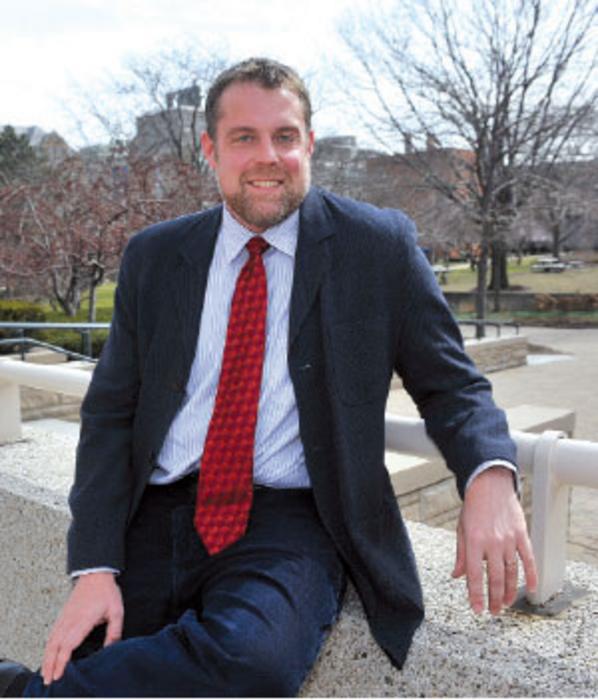CLEVELAND—What if there was a more effective way to coach and inspire your employees? Athletes? Students? Even your kids?

Credit: Case Western Reserve University
CLEVELAND—What if there was a more effective way to coach and inspire your employees? Athletes? Students? Even your kids?
A new study by a team of researchers from Case Western Reserve University suggests there is.
Their newly published work used neuroimaging to peer into the brains of participants as they responded to two different styles of coaching. The researchers wanted to see what happens in the brain that either helps people grow or causes them to resist change.
“You could say it’s about how we get around the problem that you can lead a horse to water, but you can’t make it drink,” said Anthony “Tony” Jack, the Elmer G. Beamer – Hubert H. Schneider Chair in Ethics and an associate professor in philosophy at Case Western Reserve and the study’s lead researcher.
Jack was joined by Richard Boyatzis, Distinguished University Professor and professor in the departments of organizational behavior, psychology and cognitive science at Case Western Reserve; and Case Western Reserve PhD graduate Angela Passarelli, now an associate professor of management at the College of Charleston.
All three are members of the Coaching Research Lab at Case Western Reserve’s Weatherhead School of Management.
“This work applies to all helping roles and professionals,” Boyatzis said, “from therapists, physicians, nurses, clerics, managers, teachers, faculty, social workers, dental professionals, and, yes, even parents.”
“Many who seek to help, conflate helping with fixing problems,” Passarelli said. “This research demonstrates that when we begin helping interactions by doubling down on someone’s immediate problems, we inadvertently constrain their ability to see future possibilities—and this undermines the very intention of helping.”
The study
The study involved 47 full-time Case Western Reserve undergraduates. Each had a series of 30-minute coaching sessions before entering a functional magnetic resonance imaging (fMRI) scanner. The researchers examined brain function to compare what is described in psychology as a person’s “ideal self”—the person you’d like to be—with their “real self”—the person you actually are.
An example of ideal self would be, “I am excited about the possibilities my future holds;” and real self: “I am afraid I will not achieve what is expected of me.”
The researchers used fMRI to reveal neural activity while subjects engaged in coaching and visual attention tasks. Face-to-face coaching sessions were conducted before the fMRI scan. All subjects had one coaching session focused on the real self and were randomly assigned to a varying number of ideal-self coaching sessions.
The coaching task simulated ideal and real self-based coaching interactions in a video-conference-style interaction between the participant and the coaches.
Each of the subjects was presented 96 pre-recorded videos of the coaches making statements about the participant’s educational experience or outlook on the future. The statements were developed around the themes of hope, compassion, mindfulness and playfulness in the ideal-self condition and lack thereof in the real-self condition. Subjects indicated the degree to which they agreed or disagreed with each statement.
The study built on neuroimaging research by the same team 10 years ago. Both studies used neuroscience to test aspects of Boyatzis’ Intentional Change Theory, a multi-level theory of how to achieve sustained, desired change for individuals to teams, organizations, communities and countries.
Their findings…and how to make them work for you
The researchers found something surprising that most typical coaching approaches fail to appreciate. They saw evidence of conflict between these two different ways of thinking about ourselves. This insight matters because it shows how easily “shoulds” and other self-critical thoughts can get in the way of developing a strong vision of our ideal self.
To set ourselves on a path to personal development, we need to recognize these kinds of negative thoughts create defensiveness and resistance to change, the researchers concluded.
Individuals whose ideal self is salient are better able to scan the broad environment and perceive emerging themes, the researchers asserted. They experience more positive emotion, are more open to new ideas and possess more sustained intrinsic motivation.
“Many think the best way to get others—and themselves—to change is to use some combination of carrot and stick, for instance by sandwiching a criticism with compliments,” Jack said. “These findings show why it works better to get the individual to focus first and foremost on their dreams and aspirations for the future.”
Once someone has developed a clear vision of their ideal self, he said, they become willing and eager to grow instead of willful, resistant and prone to denial.
“Many managers overestimate the importance of telling their employees about their strengths and weaknesses. The real trick is to help someone get to a place where they are actively seeking feedback for themselves,” Jack said. “Companies, coaches and managers who want people to change must hold their tongue about what they think needs fixing. Instead, they must put their faith in the individual’s intrinsic desire to grow and allow them to direct their own development process. Otherwise, they are likely to hit a wall of psychological resistance.”
###
Case Western Reserve University is one of the country’s leading private research institutions. Located in Cleveland, we offer a unique combination of forward-thinking educational opportunities in an inspiring cultural setting. Our leading-edge faculty engage in teaching and research in a collaborative, hands-on environment. Our nationally recognized programs include arts and sciences, dental medicine, engineering, law, management, medicine, nursing and social work. About 6,000 undergraduate and 6,300 graduate students comprise our student body. Visit case.edu to see how Case Western Reserve thinks beyond the possible.
Journal
Frontiers
DOI
10.3389/fnhum.2023.1128209
Method of Research
Observational study
Subject of Research
People
Article Title
When fixing problems kills personal development: fMRI reveals conflict between Real and Ideal selves
Article Publication Date
3-Aug-2023




